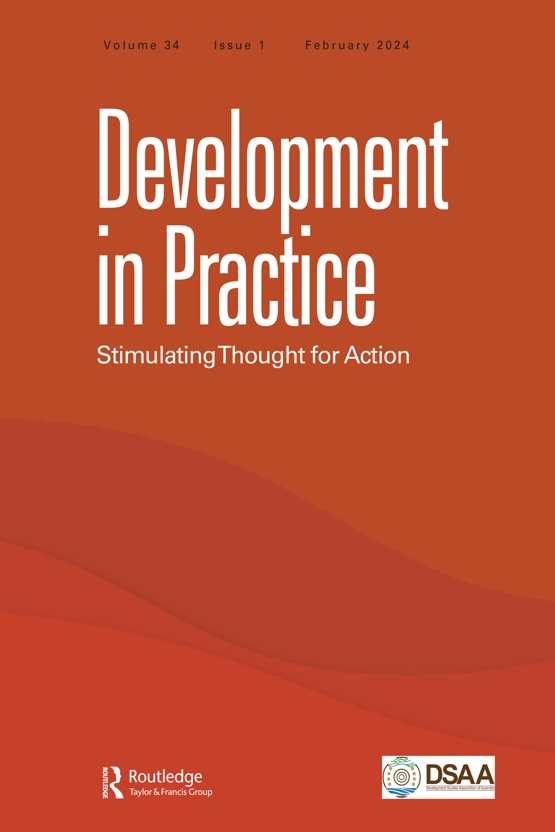Submit a Manuscript to the Journal
Development in Practice
For a Special Issue on
Gender justice in troubled times
Abstract deadline
Manuscript deadline

Special Issue Editor(s)
Dr Mirna Guha,
Anglia Ruskin University
mirna.guha@aru.ac.uk
Dr Sharmila Parmanand,
London School of Economics
s.parmanand1@lse.ac.uk
Dr Reetika Revathy Subramanian,
University of East Anglia
R.Subramanian@uea.ac.uk
Gender justice in troubled times
For this special issue, we conceptualise gender justice as attempts to recognize, visibilise, challenge, and dismantle the structures and practices that perpetuate gender-based inequalities. Gender justice calls for a historical and global understanding of social, economic, ecological and political systems that contribute to/ exacerbate discrimination and oppression while remaining attentive to the specifics of the local. In our conceptualisation (s), we are inspired by the scholarship and activism of prolific gender justice proponents, which ground our understanding within an intersectional framework, rooted in a politics of care, redistribution, recognition, and representation.
We invite contributions that examine how gender justice is experienced by marginalised and indigenous communities, often framed as subjects within development processes and ideologies. Recognising that ‘development’ predominantly occurs in the Global South, we argue that a feminist perspective requires critically interrogating interconnected global systems, historical processes, and power dynamics. Submissions should centre the Global South as the primary area of inquiry, in alignment with the journal’s focus. However, analyses of diaspora communities in the “North” are also encouraged, provided they critically engage with Southern contexts or are grounded in Southern scholarship.
We, therefore, welcome theoretical, empirical, methodological, and creative work which unsettles the boundedness of single-disciplinary thought, while provoking, resisting, prodding, and picking away at systems of injustice and inequalities. We are open to different ways in which gender is used as an analytical tool and we welcome and encourage more expansive conceptions of gender beyond the binary.
We invite interested contributors to think critically about the question of gender justice in the history and context of development as a field of study or practice, reflecting on questions outlined below:
- How has gender justice featured (or not) within pedagogical discourses on international and global development?
- How does gender justice manifest symbolically, materially, and methodologically within different domains of developmental praxis including but not limited to planetary crises, violence and conflict, work, re/production, exploitation, technological transformations, reproductive justice and movement building?
- What alternative development futures might better center gender justice?
- What could collaborative world-(re)making through the lens of gender justice look like?
Guest Editors:
Dr Mirna Guha is Senior Lecturer in Sociology at and Faculty Race Equality Lead for the Arts Humanities Education and Social Sciences at Anglia Ruskin University, Cambridge. Mirna is a political sociologist and an intersectional scholar whose research specialisms include gender and development with a focus on gendered violence and social (in)justice in the lives of marginalised communities globally. She holds a PhD in International Development from the University of East Anglia; her doctoral thesis focuses on everyday violence in the lives of marginalised women who sell sex in India. Currently, Mirna is leading on a Medical Research Council- UKPRP VISION (Violence, Health, Society) funded project, which aims to foster the leadership of Black and racialised women in domestic abuse and sexual violence service provision in East England.
Dr Sharmila Parmanand is an Assistant Professor in Gender, Development and Globalisation at the London School of Economics and Political Science and an Associate Academic at the LSE Saw Swee Hock Southeast Asia Centre. Her research examines the colonial histories and gendered logics that underpin development and humanitarian interventions in the global south, with a focus on the politics of knowledge production and feminist entanglements with the state on issues such as migration, gender-based violence, precarious labour, economic restructuring and social protection.
Dr Reetika Revathy Subramanian is a Senior Research Associate at the School of Global Development, University of East Anglia. She holds a PhD in Multidisciplinary Gender Studies from the University of Cambridge as a Gates Cambridge Scholar. She has spent over a decade working as an ethnographer and journalist writing on gender, labour migration, and climate adaptation in India. Reetika hosts the Climate Brides Podcast that examines the links between climate change and child marriage in South Asia.
Submission Instructions
Abstracts should be sent directly to the guest editors, who will select relevant abstracts and respond to the authors by 30 March 2025. Full manuscripts are due by 10 August 2025 and should be submitted directly to the journal's submission portal. Authors should provide a cover page giving brief biographical details (up to 100 words), institutional affiliation(s) and complete contact information, including an email address.
- Peer review: 9 months (August 2025-March 2026)
- Target publication: September 2026.
- Other activities to support the special issue authors: Optional (online/in-person) presentation at study group meeting at DSA 2025, Centre for Development Studies, University of Bath.

